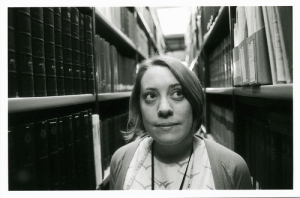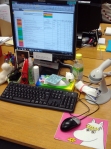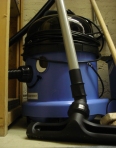Helen Faulds is Deputy Collections Manager at the University of St Andrews. She describes what brought her into the profession and a typical day in her life, finishing with some tips about where to get more information.
How did I get into the profession?
I have always loved libraries (getting my first public library card remains one of my favourite experiences) but hadn’t realised the scope of work or professional route available until I began undertaking research for my BA History dissertation on Labour politics in Falkirk; the public library staff in Falkirk could not have been more helpful, and this experience led me to seriously consider librarianship as a profession. Once I completed my first degree I began looking for work experience, and through CILIP found out about Graduate Traineeships. I was very fortunate to secure a place at Manchester Metropolitan University. This was a fantastic opportunity; MMU’s library staff provided me with an excellent insight into the type of work available as well as offering superb training and guidance. After completing an MA in Library and Information Management at MMU, I applied for a temporary Collections position at the University of St Andrews as I felt this would enable me to gain a different range of skills. (MMU is a large Undergraduate-heavy institution, whilst St Andrews is a small research-intensive institution). I have not looked back since and have been fortunate to work for supportive managers who have encouraged my development and progression here.
A day in the life of:
My main responsibilities are to support the development and management of the Library’s collection, ensuring that any collection decisions are appropriate to our community’s teaching and research needs. A typical day for me would be:
08.45 I begin the morning by checking my email and dealing with any urgent collection queries. My first query comes from the User Services team; they need help locating a print periodical ‘Discovery Reports’ for an Academic. Our catalogue record for this title on the OPAC is very basic, making it difficult for users to locate, but I find the volume, place it on the hold shelf for the user, and contact them to let them know it is available. As the catalogue record requires significant work, I liaise with the periodicals cataloguer who then upgrades the record so that it is now accurate. Here at St Andrews, not all of our print holdings are identified on our Library Management System. This is particularly true for print periodicals and while we’re working hard to rectify the problem, we find we still have to refer to the paper catalogue occasionally.
10.00 The next task scheduled in my diary relates to the UK Research Reserve. I am responsible for the Library’s involvement in UKRR; titles we had submitted to the process are requested by the British Library to fill gaps in their ILL copies. I gather the volumes and pack them ready to be sent to Boston Spa. I then arrange a time with the periodicals cataloguer to amend the existing catalogue records to reflect the transfer of these items. This is an area of my job I particularly enjoy, as I believe national collaborative initiatives for collection management in the UK are the most effective option not only for ensuring the preservation of print materials, but also helping to relieve the space pressures many research academic libraries are now facing.
UKRR is one of the main tools we currently utilise for managing our low-use print periodical material. Our Main Library is 98% full and until we have a new Library Store my team is busy trying to maximise the little remaining space we have. Although 80% of our Library budget is currently spent on electronic content, the 20% used for purchasing print is still hugely significant in size. Without national projects such as UKRR, finding space for newly purchased print material would be far more difficult.
11.30 I am one of the co-authors of the Library’s Business Continuity plan; I also support disaster management training for library staff and am the Deputy Salvage Manager for the general library collection. I attend a meeting with the Library’s Cleaning Supervisors and the Manager of the Buildings Operations Team. This is to ensure that when cleaning staff are the only staff in the building they are informed about raising the alarm in the event of a small-scale disaster, such as a minor water incursion.
14.00 The next task in my diary is another space-saving one – in order to maximise our shelf space, I am currently working to evaluate a departmental library collection against our Main Library holdings, determining the level of duplication and looking for areas to weed. Our current collection policy is to retain one copy of each monograph, so we look to withdraw low-use multiple-copy monographs to provide us with space for new stock. Once I have undertaken the assessment and provided suggestions, my colleagues in Academic Liaison will speak with our community to ensure any withdrawal decisions will be appropriate.
16.00 The final task of the day is to assess with the Collections Manager and Store Assistant material for transfer to our Special Collections department. Taking a laptop down to our basement stacks where this material is located, we check first to see that the material has accurate catalogue records, then that they are located correctly on the system, and finally box the material to be transferred.
I thoroughly enjoy working on the Library’s general collections; my work is varied and enables me to work closely with other library staff and our users, but can also be very physical e.g. one of our team’s successes last year was organising and moving a collection into our new library facility – the Martyrs Kirk Research Library. We were able to achieve the stock move in 2 days [thank you to Vicki Cormie for her photograph].
If you’re interested in collection management in the UK:
COPAC Collection Management: I was fortunate enough to attend a training event last year on how to utilise these, and have already begun to see the benefit they can provide. The visualisation results are super and well worth investigating.
Thanks to Helen for telling us about her day and sharing such varied photos – I do like Charles! Helen is happy to answer questions by email or in person. In the first instance, please leave a comment below.





